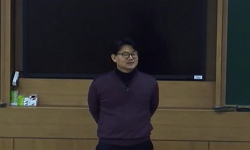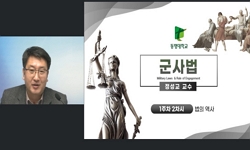명확성원칙은 법률의 위헌여부를 심사하는 독자적 심사기준으로서 헌법원칙이다. 헌법재판소는 그 동안 과잉금지원칙과 더불어 명확성원칙을 중요한 심사기준으로 하여 법률의 위헌여부...
http://chineseinput.net/에서 pinyin(병음)방식으로 중국어를 변환할 수 있습니다.
변환된 중국어를 복사하여 사용하시면 됩니다.
- 中文 을 입력하시려면 zhongwen을 입력하시고 space를누르시면됩니다.
- 北京 을 입력하시려면 beijing을 입력하시고 space를 누르시면 됩니다.

헌법재판소의 명확성원칙의 적용에 관한 고찰 = A Study on the Principle of Clarity as Applied by the Constitutional Court
한글로보기https://www.riss.kr/link?id=A107218160
- 저자
- 발행기관
- 학술지명
- 권호사항
-
발행연도
2020
-
작성언어
-
- 주제어
-
등재정보
KCI등재
-
자료형태
학술저널
-
수록면
31-53(23쪽)
-
KCI 피인용횟수
0
- 제공처
- 소장기관
-
0
상세조회 -
0
다운로드
부가정보
국문 초록 (Abstract)
또한 위헌심사기준의 경합에 있어서, 위임입법에서의 수권법률에 대한 명확성 심사와 포괄위임금지 여부를 병합적으로 심사하는 것은 실익이 없으므로 위임범위의 한계에 대한 심사를 통하여 명확성원칙을 실현하는 것으로 일원화할 필요가 있다는 것이다. 마찬가지로 과잉금지원칙과의 관계에서도 불명확한 법률에 의한 기본권제한의 정도를 심사하는 것은 정당하지도 또한 가능하지도 않다는 것에서 명확성원칙의 심사로서 충분하다는 점 또한 고려되어야 한다고 하였다.
명확성원칙은 법률의 위헌여부를 심사하는 독자적 심사기준으로서 헌법원칙이다. 헌법재판소는 그 동안 과잉금지원칙과 더불어 명확성원칙을 중요한 심사기준으로 하여 법률의 위헌여부를 심사하여 왔다. 그 일련의 과정에서 헌법재판소는 헌법원칙으로서의 명확성원칙의 헌법적 근거, 심사기준 및 심사강도 그리고 다른 위헌심사기준과의 경합의 경우 그에 관한 해소 등의 문제를 구체화하였다. 본고는 이에 관한 그 동안의 헌법재판소의 판례를 범위로 하여 그 내용을 검토하고, 몇 가지 보완적 의견을 제시하는 것으로 구성하였다. 본고에서 명확성원칙에 관한 보완적 의견으로 제시된 것은, 우선 헌법원칙으로서 명확성원칙의 근거에 관하여 명확하게 한하여야 한다는 것이다. 법률의 명확성요청은 법치국가원리의 핵심적 내용인 법적 안정성과 신뢰보호의 요청에 의한 것으로서, 법치국가에 근거한 헌법원칙이라는 점이 통일적으로 표현되어야 한다는 것이다. 그리고 명확성원칙의 심사기준으로서 예측가능성의 판단 관점을 완결적 법률과 위임입법의 경우를 각각 구분하여 설정하여야 한다는 것이다. 즉 완결적 법률의 경우에는 수범자로서의 국민, 그리고 위임입법의 경우에는 위임입법의 구조에 따라 행정입법의 제정주체의 관점에서 확인되어야 한다는 것이다. 이에 따라서 완결적 법률에 비해 위임입법에서는 명확성원칙의 완화된 적용이 필요하다는 것이다.
또한 위헌심사기준의 경합에 있어서, 위임입법에서의 수권법률에 대한 명확성 심사와 포괄위임금지 여부를 병합적으로 심사하는 것은 실익이 없으므로 위임범위의 한계에 대한 심사를 통하여 명확성원칙을 실현하는 것으로 일원화할 필요가 있다는 것이다. 마찬가지로 과잉금지원칙과의 관계에서도 불명확한 법률에 의한 기본권제한의 정도를 심사하는 것은 정당하지도 또한 가능하지도 않다는 것에서 명확성원칙의 심사로서 충분하다는 점 또한 고려되어야 한다고 하였다.
다국어 초록 (Multilingual Abstract)
This paper consists of reviewing the contents of the previous Constitutional Court precedents as a scope, and presenting some complementary opinions. What is suggested as a supplementary opinion on the clarity principle in this paper is that first, as a constitutional principle, the basis for the clarity principle should be clarified. The request for clarity of the law is a request for legal stability and trust protection, which are the core contents of the rule of law, and the point that it is a constitutional principle based on the rule of law must be expressed in a unified manner. And the point of view of judgment of predictability as a criterion for examination of the principle of clarity should be set separately for the case of conclusive legislation and delegated legislation. In a conclusive law, predictability should be judged from the perspective of the general public and in delegated legislation, predictability should be confirmed from the perspective of the enacting entity of the administrative legislation.
In competition for unconstitutional screening, it is not practical to review the principle of clarity and the rule of comprehensive delegation support. That is, it is reasonable to examine only the clarity of the limits of the scope of delegation.
In addition, even in competition with principle of prohibition of excess limit, the restriction by the unclear law does not satisfy the formal requirements of the restriction of basic rights, so there is no need to examine the degree of restriction.
The principle of clarity is a constitutional principle as an independent examination criterion for examining whether or not a law is unconstitutional. The Constitutional Court has been examining whether or not the law is unconstitutional, using the pr...
The principle of clarity is a constitutional principle as an independent examination criterion for examining whether or not a law is unconstitutional. The Constitutional Court has been examining whether or not the law is unconstitutional, using the principle of clarity as an important examination criterion. In the leading case, the Constitutional Court clarified the constitutional basis of the principle of clarity as a constitutional principle, the examination standards and examination intensity, and the resolution of conflict with other unconstitutional examination standards.
This paper consists of reviewing the contents of the previous Constitutional Court precedents as a scope, and presenting some complementary opinions. What is suggested as a supplementary opinion on the clarity principle in this paper is that first, as a constitutional principle, the basis for the clarity principle should be clarified. The request for clarity of the law is a request for legal stability and trust protection, which are the core contents of the rule of law, and the point that it is a constitutional principle based on the rule of law must be expressed in a unified manner. And the point of view of judgment of predictability as a criterion for examination of the principle of clarity should be set separately for the case of conclusive legislation and delegated legislation. In a conclusive law, predictability should be judged from the perspective of the general public and in delegated legislation, predictability should be confirmed from the perspective of the enacting entity of the administrative legislation.
In competition for unconstitutional screening, it is not practical to review the principle of clarity and the rule of comprehensive delegation support. That is, it is reasonable to examine only the clarity of the limits of the scope of delegation.
In addition, even in competition with principle of prohibition of excess limit, the restriction by the unclear law does not satisfy the formal requirements of the restriction of basic rights, so there is no need to examine the degree of restriction.
참고문헌 (Reference)
1 한수웅, "헌법학" 법문사 2019
2 이준일, "헌법재판소가 이해하는 명확성원칙의 비판적 재구성" 한국헌법학회 7 (7): 2001
3 오영신, "헌법재판과 위헌심사기준" 법문사 2018
4 정극원, "헌법재판과 명확성의 원칙" 한국비교공법학회 15 (15): 3-32, 2014
5 이부하, "포괄위임입법금지원칙에 대한 헌법재판소 견해의 평가" 법학연구소 29 (29): 315-350, 2016
6 전종익, "포괄위임금지원칙의 심사기준" 법학연구소 7 (7): 11-34, 2013
7 이부하, "법적 안정성의 의미에서 명확성의 원칙" 세계헌법학회한국학회 20 (20): 1-21, 2014
8 임웅, "법의 흠결과 형법의 유추해석금지" 한국형사법학회 (21) : 81-98, 2004
9 이상경, "명확성의 원칙과 포괄위임입법금지원칙" 서울시립대학교 법학연구소 22 (22): 447-476, 2015
10 성기용, "명확성원칙에 관한 소고- 헌법재판소 99헌마480 결정을 중심으로 -" 법학연구소 16 (16): 1-23, 2011
1 한수웅, "헌법학" 법문사 2019
2 이준일, "헌법재판소가 이해하는 명확성원칙의 비판적 재구성" 한국헌법학회 7 (7): 2001
3 오영신, "헌법재판과 위헌심사기준" 법문사 2018
4 정극원, "헌법재판과 명확성의 원칙" 한국비교공법학회 15 (15): 3-32, 2014
5 이부하, "포괄위임입법금지원칙에 대한 헌법재판소 견해의 평가" 법학연구소 29 (29): 315-350, 2016
6 전종익, "포괄위임금지원칙의 심사기준" 법학연구소 7 (7): 11-34, 2013
7 이부하, "법적 안정성의 의미에서 명확성의 원칙" 세계헌법학회한국학회 20 (20): 1-21, 2014
8 임웅, "법의 흠결과 형법의 유추해석금지" 한국형사법학회 (21) : 81-98, 2004
9 이상경, "명확성의 원칙과 포괄위임입법금지원칙" 서울시립대학교 법학연구소 22 (22): 447-476, 2015
10 성기용, "명확성원칙에 관한 소고- 헌법재판소 99헌마480 결정을 중심으로 -" 법학연구소 16 (16): 1-23, 2011
동일학술지(권/호) 다른 논문
-
- 한국법정책학회
- 이경렬 ( Kyung-lyul Lee )
- 2020
- KCI등재
-
- 한국법정책학회
- 김상중 ( Sang-joong Kim )
- 2020
- KCI등재
-
개정된 공직선거법상 비례대표 의석배분 방식이 지닌 구조적인 문제점과 대안의 검토
- 한국법정책학회
- 남복현 ( Bok-hyeon Nam )
- 2020
- KCI등재
-
- 한국법정책학회
- 조홍석 ( Hong-suck Cho )
- 2020
- KCI등재
분석정보
인용정보 인용지수 설명보기
학술지 이력
| 연월일 | 이력구분 | 이력상세 | 등재구분 |
|---|---|---|---|
| 2026 | 평가예정 | 재인증평가 신청대상 (재인증) | |
| 2020-01-01 | 평가 | 등재학술지 유지 (재인증) |  |
| 2017-01-01 | 평가 | 등재학술지 유지 (계속평가) |  |
| 2013-01-01 | 평가 | 등재학술지 유지 (등재유지) |  |
| 2010-01-01 | 평가 | 등재 1차 FAIL (등재유지) |  |
| 2007-01-01 | 평가 | 등재학술지 선정 (등재후보2차) |  |
| 2006-01-01 | 평가 | 등재후보 1차 PASS (등재후보1차) |  |
| 2004-01-01 | 평가 | 등재후보학술지 선정 (신규평가) |  |
학술지 인용정보
| 기준연도 | WOS-KCI 통합IF(2년) | KCIF(2년) | KCIF(3년) |
|---|---|---|---|
| 2016 | 0.93 | 0.93 | 0.77 |
| KCIF(4년) | KCIF(5년) | 중심성지수(3년) | 즉시성지수 |
| 0.73 | 0.71 | 0.839 | 0.41 |





 KCI
KCI KISS
KISS





